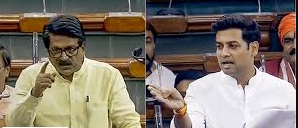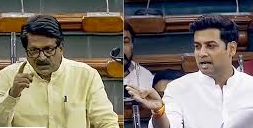
Manas Dasgupta
NEW DELHI, Apr 2: The Waqf amendment bill on Wednesday brought the two factions of the Shiv Sena face to face against each other with fierce war of words in support of the opposite camps.
Union Minority Affairs Minister Kiren Rijiju tabled the Waqf (Amendment) Bill, 2025, which was examined and redrafted by a Joint Parliamentary Committee (JPC), and, as the government claimed, seeks to improve the functioning of Waqf properties, address complexities, ensure transparency and introduce technology-driven management.
Opposing the bill, the Shiv Sena UBT’s Arvind Sawant said this could happen with Christians, Jains and Sikhs too. The manner in which they have brought the bill showed that “apke mann mein kuch aur hi hai”. We need harmony not hatred.”
MP Shrikant Shinde, the son of Maharashtra deputy chief minister Eknath Shinde, however, hit back at UBT. “UBT has started getting allergic to Hindus today. If Bala Saheb Thackeray were alive today, he would have been hurt by UBT’s attitude…Waqf lands have been increasing all these years. The bill was a ray of hope for poor Muslims.”
Mr Eknath Shinde had told the media in Mumbai, “Shiv Sena’s stand on the Waqf Board has always been clear… We will never compromise on our views for power or selfishness… Our stand on the Waqf Amendment Bill is also clear… The Waqf Amendment Bill is for the welfare of the common people of the Muslim society, for their progress.”
Eknath Shinde had in 2022 engineered a split in the Uddhav Thackeray-led Sena, claiming that the party has forgotten Hindutva and the values upheld by Bal Thackeray. The two groups have since become bitter rivals, not leaving an opportunity to pull the other down.
As of 2004, a total of 4.9 lakh properties were held by the Waqf and their income was just Rs 163 crore, Rijiju said. After the 2013 amendment, the minister said, the income has gone up by just Rs 3 crore to Rs 166 crore. “We can’t accept such meagre income from such a huge bank of properties. The income should have been at least Rs 12,000 crore. Waqf property has to be used for poor Muslims, and the Waqf Bill is needed to achieve this purpose,” he said.
Mr Rijiju also introduced another Bill — The Mussalman Waqf (Repeal) Bill, 2024 — for consideration and passage in the House. According to the Waqf (Amendment) Bill, Waqf tribunals will be strengthened, a structured selection process will be maintained, and a tenure will be fixed to ensure efficient dispute resolution. As per the Bill, while Waqf institutions’ mandatory contribution to Waqf Boards reduced from 7 per cent to 5 per cent, Waqf institutions earning over Rs 1 lakh will undergo audits by state-sponsored auditors.
A centralised portal will automate Waqf property management, improving efficiency and transparency.
The Bill also proposes that practising Muslims (for at least five years) can dedicate their property to Waqf, restoring pre-2013 rules. Also, women must receive their inheritance before Waqf declaration, with special provisions for widows, divorced women and orphans. The Bill also proposes that an officer above the rank of collector will investigate government properties claimed as Waqf.
In case of disputes, the senior government official will have the final say on whether a property belongs to Waqf or the government. This replaces the existing system where such decisions are made by Waqf tribunals. The Bill also proposes that non-Muslim members will be included in the central and state Waqf boards for inclusivity.














